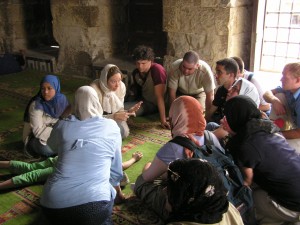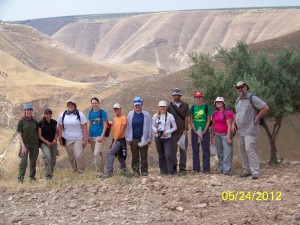By: Dr. Bethany J. Walker
Annemarie Schimmel Kolleg, University of Bonn
When I was asked to contribute to ASOR’s blog posts celebrating women in Middle Eastern archaeology, I was honored and perplexed. My personal story is not particularly special or interesting, in my eyes. I am happy to share it, however, as it is in the culmination of all of our experiences that a story of women in the field can be told and lessons learned for the future.
It is good to start early. I am one of the lucky ones, I suppose, in that I am doing today exactly what I have wanted to do since the age of six, when I finally realized what the difference was between “paleontology” (my first love – what child doesn’t love dinosaurs??) and “archaeology”. My inspiration was a special woman – my material grandmother, Jean Armagost. A career in archaeology was also her dream, but having grown up during the Depression Era, and at a time when this was the pursuit of the elite, she never had the opportunity to realize it. She seemed to have unlimited time for me and never tired of telling me stories, reading to me, watching archaeology programs on TV with me, and taking me to museums and archaeological and historical sites. Though she passed away over a decade ago, she has continued to be my role model in teaching (which she did on a volunteer basis): you should always have time for your students, and you have a responsibility to help others professionally, as you were along the way. Family encouragement was invaluable. My father, Ray Walker, a professional sportscaster (now retired), never described careers in gendered terms. His aspirations for me were to follow in his footsteps and go “on the air” (which I did with him as a teenager, on the radio); if not that, then I should throw myself 100% into archaeology.
Your choice of university matters. I chose wisely – Bryn Mawr College. It was the only school to which I applied my senior year in high school, and it was one of the best decisions I have ever made. At the time, it was the only internationally known, stand-alone department of archaeology in the U.S. It had also consistently, for over a century, produced many of the world’s women leaders in Classical and Near Eastern archaeology. I was surrounded there by strong, independently-minded, creative, and quirky women. Many of my classmates now occupy prominent positions in the field. There was no field then of “Islamic archaeology” at Bryn Mawr, or anywhere else in the U.S., for that matter, so I made do with anything Middle Eastern. In graduate school I got degrees in Area Studies programs. It was exactly the wide training I needed, and has given me the tools to work with Arabic texts as much as ceramics. I think such a broad base is also an asset when entering the job market.
Be flexible and open-minded. I had very clear ideas about what I wanted when I went to university, many of those ideas based on nothing more than imagination and misconceptions. I chose Bryn Mawr initially to study Egyptology, because I loved Egypt. I fully intended on specializing in architecture - and absolutely not ceramics, which I thought would require from me culinary skills. Cities and cemeteries – those were the kinds of sites I would excavate. Instead, I entered the emerging field of Islamic archaeology (as what I was really drawn to was the Middle East and the Middle Ages), have specialized in ceramics (and I am so glad I did!), and excavate rural Jordan (who would have known that the “imperial frontier” could be so exciting?).

Sultan Qaytbay funerary complex, Cairo City of the Dead Grand Valley State University A teaching moment.
Islamic archaeology is not closed to women. In fact, quite the opposite is true: it is one of the most gender-friendly areas of specialization within the field. I suppose there are a couple of reasons for this. The first is the result of its disciplinary parentage: Islamic archaeology essentially grew out of Islamic art history, in which women scholars have been prominent. The second may have something to do with its newness: we can make of this discipline what we like and define it in our own terms, at least at this stage.
As I look back on the last twenty years, I have seen the field of Islamic archaeology emerge as a new field of study and grow in rich and varied ways. I have been fortunate enough to be at the right place, at the right time, and to be part of this exciting development. When I was a student, Islamic archaeology did not exist as a discipline of its own, and now it is one of the most energized areas of archaeology and is rapidly attracting public interest. It also has local support in Muslim countries. There are more opportunities today than ever before for women to enter the field. I do, however, have concerns. Although women now constitute half of the students in my classrooms – and I have led several field schools with all-women teams (participants all self-selecting) - few of them continue on professionally, in any kind of archaeology. This seems to be true in both the U.S. and Europe. It seems to be difficult to keep women in the field after graduation. Dreams often get swept away with the realities of life and the sacrifices demanded of us. Fieldwork is hard, as it takes us away from responsibilities at home and requires sacrifice of our loved ones, in return. There are solutions, though. “Family friendly” excavations, in which spouses and children are welcome, take the sting out of the long periods of long distance that fieldwork overseas requires. Making an academic career in any field is a challenge, particularly when so many women now meet their life partners in graduate school. Fortunately, American universities are increasingly exploring the option of dual-career hires, which can be accomplished in creative and fruitful ways. These are positive, and necessary, developments that offer hope for the future.
Visit Dr. Walker’s faculty page here.
~~~
All content provided on this blog is for informational purposes only. The American Schools of Oriental Research (ASOR) makes no representations as to the accuracy or completeness of any information on this blog or found by following any link on this blog. ASOR will not be liable for any errors or omissions in this information. ASOR will not be liable for any losses, injuries, or damages from the display or use of this information. The opinions expressed by Bloggers and those providing comments are theirs alone, and do not reflect the opinions of ASOR or any employee thereof.
